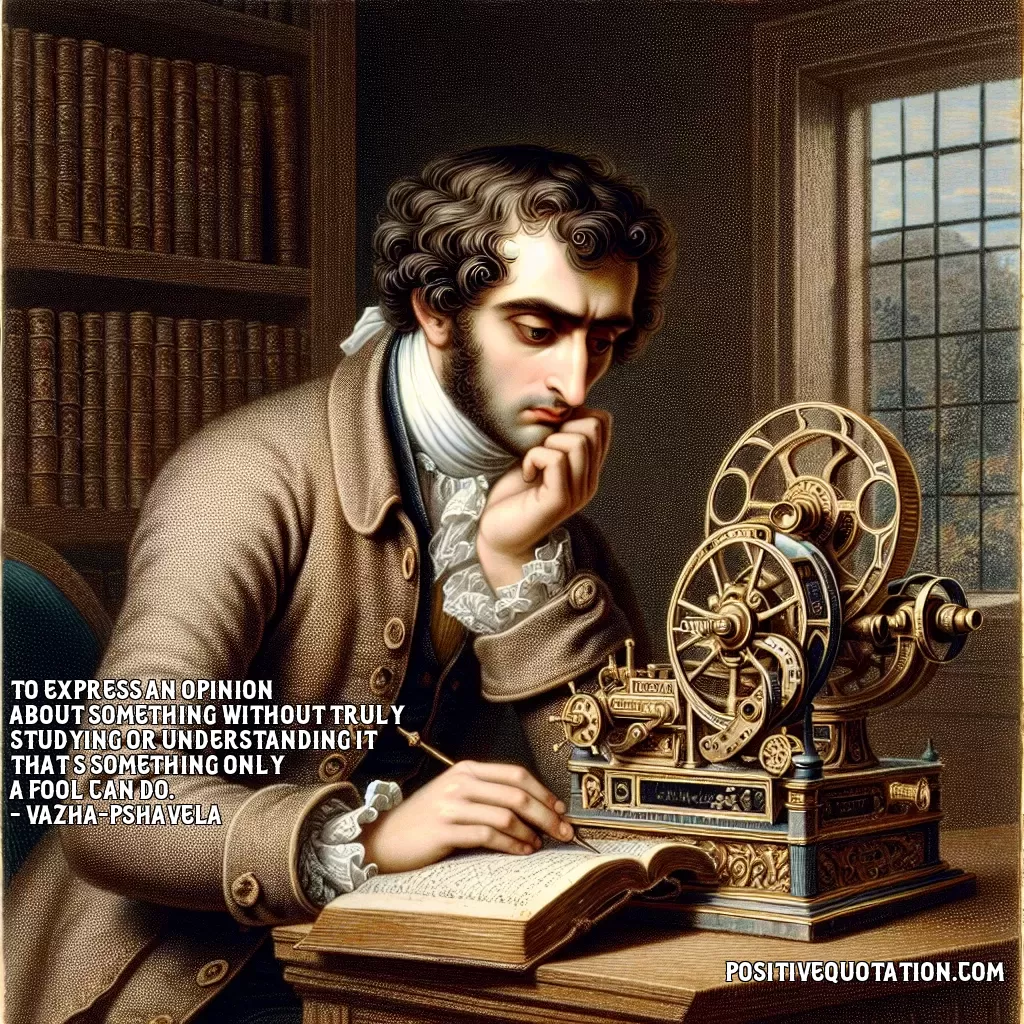
To express an opinion about something without truly studying or understanding it that’s something only a fool can do. - Vazha-Pshavela
Author: Vazha Pshavela
👁️ 14 views

To express an opinion about something without truly studying or understanding it that’s something only a fool can do. - Vazha-Pshavela
👁️ 14 views
This quote by Vazha-Pshavela highlights the importance of informed opinions and the danger of superficial judgments. When someone expresses an opinion without truly studying or understanding the subject, they risk falling into the trap of ignorance, which can lead to miscommunication, misinformation, and flawed decision-making. The quote implies that it is not only unwise but also foolish to speak authoritatively on topics without having done the necessary research or thinking critically about the subject. A fool, in this context, refers to someone who disregards the importance of knowledge and understanding, preferring instead to rely on assumptions, biases, or hearsay. This behavior is particularly problematic because it can perpetuate falsehoods and misleading narratives. Such individuals may believe they understand a topic when, in reality, their perspective is shallow and unfounded. Moreover, the quote suggests that true wisdom lies in the willingness to learn and the humility to admit when one does not know enough about something to form a credible opinion. It encourages individuals to engage in thorough research, critical thinking, and open-minded dialogue before expressing their views. In doing so, people not only contribute more meaningfully to discussions but also foster a culture of informed discourse and mutual understanding. This approach ultimately supports the growth of knowledge and the betterment of society as a whole. By acknowledging the limitations of one's knowledge and seeking to expand it, one avoids the pitfalls of ignorance and contributes to a more enlightened and informed community.
Quote By: Vazha Pshavela
Vazha Pshavela, born on July 17, 1861, in the village of tsebelda in the Pshavi region of Georgia, stands as one of the most celebrated figures in Georgian literature. His real name was Luka Razikashvili, but he adopted the pen name Vazha Pshavela, which reflects his deep roots in the Pshavi culture and geography. Pshavela's upbringing in the mountainous, rugged terrain of Georgia greatly influenced his literary themes, which often explored the intertwining of nature, folklore, and the human experience.
Vazha Pshavela's works are characterized by their rich imagery and profound philosophical undertones. He began his literary career in the late 19th century, and his contributions to Georgian poetry and prose are both vast and notable. His most famous works include "The Madman", "The Snake Eater", and "Aluda Katamadze", which reflect the struggles of individuals against societal and natural forces. Pshavela’s poetry often highlighted the themes of sacrifice, honor, and the deep connection between humans and nature, revealing a narrative style that blends realism with lyrical beauty.
Despite the challenges of his time, including political tumult and social change in Georgia, Vazha Pshavela remained dedicated to his craft, continually drawing inspiration from his homeland's traditions and the philosophical questions of life. His distinctive voice and perspective made him a crucial figure in the Georgian Renaissance, a period marked by a revival in national identity and cultural expression.
Pshavela’s impact on Georgian literature extends beyond his own writings; he has inspired generations of writers and poets who followed. His legacy is celebrated not only in Georgia, where he is often referred to as one of the nation’s greatest poets, but also in the wider literary world. Vazha Pshavela passed away on July 10, 1915, but his works continue to resonate with readers, symbolizing the rich cultural heritage of Georgian literature and the enduring human spirit. Today, Vazha Pshavela remains a revered figure, embodying the struggle and beauty of the human experience through his powerful storytelling.